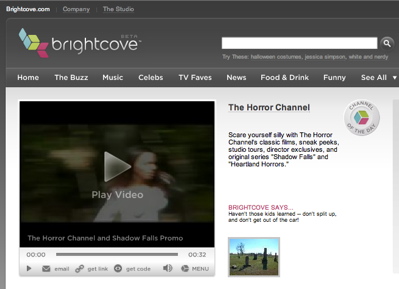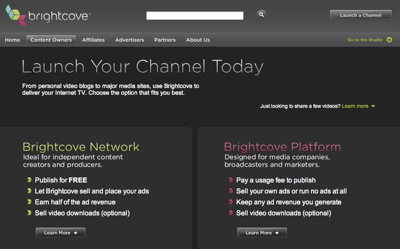My friend Jeremy Allaire busted out of the gates again today with a story that’s all over the web about his firm Brightcove, which is not just any old startup.  It’s backed by Barry Diller’s IAC/InterActiveCorp and America Online, among others. And it boasts a management team with senior execs from Allaire, Macromedia, ATG, Comcast, Lycos, News Corp., MediaVest, and Discovery Networks. The firm just announced the launch of its Brightcove Network, which is aimed at what it calls “video prosumers” — the ranks of which are dead certain to be growing. I know for sure that will include me, but it won’t be just us tech-savvy folks.
It’s backed by Barry Diller’s IAC/InterActiveCorp and America Online, among others. And it boasts a management team with senior execs from Allaire, Macromedia, ATG, Comcast, Lycos, News Corp., MediaVest, and Discovery Networks. The firm just announced the launch of its Brightcove Network, which is aimed at what it calls “video prosumers” — the ranks of which are dead certain to be growing. I know for sure that will include me, but it won’t be just us tech-savvy folks.
As background, you may recall I published an interview with Jeremy earlier this year, onsite from the PC Forum conference in San Diego. And I also chatted at dinner one night there with his PR people, who had recently secured a front-page feature on Jeremy in the Wall Street Journal. Then, this morning, my buddy Mark Druskoff shot me an email on all this Brightcove attention today (he’s the former editor of Minnesota Business magazine, now working in Texas). He also pointed out that Barry Diller will likely earn the distinction of being this year’s highest paid executive. Yes, and a good guy for Jeremy to have on his board.
Here’s the latest Brightcove news as the WSJ covered it today (subscribers only), and CNet did a piece as well. For other background, here’s a TechCrunch post just out by Marshall Kirkpatrick, and a great wrapup on what it all means from Forbes.com, entitled “AnotherTube.”
Call it the revenge of the media industry. This is about professional video, or at least semi-professional — something more polished than raw crap, anyway.  Let’s face it, consumer-generated video is hardly what everybody wants to spend most of their time watching on the Internet going forward! Hey, this broadband video thing is just getting going. And no firm, startup or otherwise, is better positioned than Brightcove to take advantage of what will be a very, very BIG market — all kinds of video, from professional on down to user-generated.
Let’s face it, consumer-generated video is hardly what everybody wants to spend most of their time watching on the Internet going forward! Hey, this broadband video thing is just getting going. And no firm, startup or otherwise, is better positioned than Brightcove to take advantage of what will be a very, very BIG market — all kinds of video, from professional on down to user-generated.  Think online video marketplace, with every angle covered…and everyone makes money. Unique concept, huh? Making money. Quick, somebody get the YouTube-Google folks on the line — they’ll want to look at this!
Think online video marketplace, with every angle covered…and everyone makes money. Unique concept, huh? Making money. Quick, somebody get the YouTube-Google folks on the line — they’ll want to look at this!
I think Abbey Klaassen of Ad Age gets it right today in her commentary, in which she doesn’t hold back the optimism of her employer on this news: Meet the Next Media Mogul: Jeremy Allaire.
I would not bet against her being right.
 Here’s the terse email she sent to those of us on her Release 1.0 list: “Word has slowly gotten out that the PC Forum last March was the last ever. So let me interview myself.” And a link then takes us
Here’s the terse email she sent to those of us on her Release 1.0 list: “Word has slowly gotten out that the PC Forum last March was the last ever. So let me interview myself.” And a link then takes us  Here’s a rundown of those speakers
Here’s a rundown of those speakers  advantage of that service and created a swicki for my own blog, which I set up and took live in about 15 minutes. You can see it at the right, complete with what’s called the “buzz cloud” within the widget itself.] In its announcement, Eurekster said publishers are invited to create their own swickis, free of charge, with the Eurekster SwickiBuilder
advantage of that service and created a swicki for my own blog, which I set up and took live in about 15 minutes. You can see it at the right, complete with what’s called the “buzz cloud” within the widget itself.] In its announcement, Eurekster said publishers are invited to create their own swickis, free of charge, with the Eurekster SwickiBuilder  on Monday afternoon, CEO Gilmour spoke of the ready market for Illumio: “There will be something like 50 million desktop search engines by the end of 2006, and there will be zero PCs without desktop search after the next OS generation.” He said his company’s Illumio technology now supports Google and MSN desktop search, and others will follow. It searches files, documents, email, contacts, favorites, browser cache, appointments, and more. He allowed, however, that a problem with desktop search is privacy. “The market is hyper-sensitive about that,” and he said his company works hard on it.
on Monday afternoon, CEO Gilmour spoke of the ready market for Illumio: “There will be something like 50 million desktop search engines by the end of 2006, and there will be zero PCs without desktop search after the next OS generation.” He said his company’s Illumio technology now supports Google and MSN desktop search, and others will follow. It searches files, documents, email, contacts, favorites, browser cache, appointments, and more. He allowed, however, that a problem with desktop search is privacy. “The market is hyper-sensitive about that,” and he said his company works hard on it.
Recent Comments